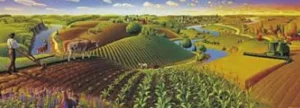At the beginning of this week’s parashah, God commands Moshe to ascend a mountain and look out in every direction—westward, northward, southward, and eastward—to see the Land of Israel with his own eyes, though he would not be allowed to cross the Jordan. One can only imagine what Moshe felt in that moment: the land he had yearned for, stretched out before him like a map, so close and yet beyond his reach.
God knew how deeply Moshe longed to enter the Land. So why show it to him, knowing he would never set foot in it? Chazal teach that each of the Avot is associated with a unique middah: Avraham with chesed (kindness), Yitzchak with gevurah (restraint), Yaakov with tiferet (harmony). Moshe’s defining quality, however, is netzach—eternity. Everything Moshe did was eternal, and for this reason, he was the one through whom God gave the Torah, which itself is eternal.
Had Moshe entered Eretz Yisrael, that entry would have become eternal as well. The Jewish people would never have been able to leave. But HaShem, in His infinite wisdom, knew that Am Yisrael would not yet be able to sustain the high spiritual level that the Land demands. Exile would become necessary. Therefore, Moshe could not enter. But this was not a punishment meant to tantalize or torment him. The deep longing Moshe experienced on that mountaintop became embedded in the heart of the nation—an eternal spiritual inheritance.
This longing reemerged generations later, in a striking moment at the Sixth Zionist Congress in Basel in 1903. When Theodor Herzl proposed Uganda as a temporary refuge for Russian Jews, the Russian delegation stormed out. These were not religious men, yet they instinctively understood: the Jewish state could only be in the Land of Israel. That reaction came from somewhere deeper—from a place in the Jewish soul shaped by Moshe’s vision.
Our prayers, our blessings after meals, our daily yearning—all are filled with references to the Land of Israel. Through every moment of our long exile, the Jewish people have never stopped longing for that Land, just as Moshe did as he stood on the mountain and looked out toward the destiny he would not personally fulfill.
NOTE: The above is a summary based on the original teaching.

